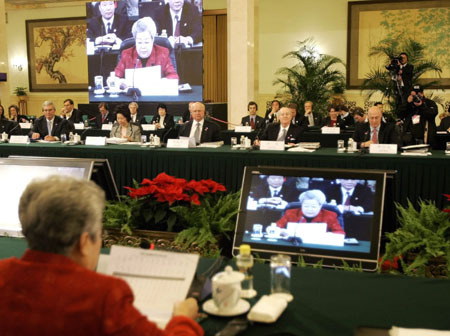Dialogue 'is a chance to clear the air'
By Qin Jize and Li Xing (China Daily)Updated: 2006-12-15 06:56
"The dialogue is conducive to enhancing trust and dispelling suspicion to strengthen the dialogue between China and the United States in the economic field," Wu said.
Led by Wu and Paulson, more than 20 senior policy makers from Beijing and Washington started the two-day meeting in the Great Hall of the People.
In her keynote speech, Wu pledged that China would continue reforms and broaden the level of opening-up by improving the legal and policy system and strengthening protection of intellectual property rights.
She elaborated on China's adherence to peaceful development, reform and opening-up.
"China's development will not pose any threat; it offers opportunities to the world," Wu said.
She said China is rapidly increasing imports to offset the trade surplus with the US and strive for a trade balance.
Paulson said he agreed with Wu that the US needs to better understand China's drive to reform its economy.
"But having said that, there's certain things that there's plenty of understanding on," he said after the first day of talks.
"There's no lack of understanding about currency flexibility or intellectual property and those kinds of issues."
While describing the talks as "productive and informative interchanges," he said it was not reasonable to expect that, after only two days of talks, concrete agreements would be announced.
"It wouldn't be much of a dialogue if you could come in and, in two days, sit down and announce major breakthroughs," he said.
"The kinds of issues we are working on are ones that are very fundamental and very long-term," the US treasury chief said.
Paulson said that when the talks wind up today, they might be able to set out "work plans" to move forward on resolving some of the economic issues that each sees as important.
Five special discussion sessions have been scheduled during the dialogue, focusing on such issues as balanced development in urban and rural areas, sustainable development, trade, investment, energy and the environment.
The dialogue comes at a time when the China-US trade relationship enters a more complicated stage with the five-year interim period after China's WTO accession coming to an end on December 11. That means China would face more intense foreign competition in various fields.
"That's why China and the US are holding the strategic economic dialogue at this time," said Yan Xuetong, a researcher with Tsinghua University. "The dialogue will help avoid the escalation of trade disputes."
Mei Xinyu, a researcher at the Trade Research Institute of the Ministry of Commerce, added: "The significance lies in enhancing mutual understanding and identifying long-term, strategic principles that the two countries share."
Lu Feng, an economics professor at Peking University, said it is a wise move for Beijing and Washington to sit down and get to know each other's concerns.
The talks would have positive effects on pushing forward trade and investment and break down barriers, Lu said.
Ma Zhen'gang, president of the China Institute of International Studies, said the frequent high-level exchanges between the two sides help develop common understanding.
Speaking to about 500 students of the Graduate University of the Chinese Academy of Sciences yesterday at the Chinese Sciences and Humanities Forum, Ma said China and the United States now see their relations and common interests as more intertwined than ever before.
No one can deny that Sino-US trade is mutually complementary and beneficial, he said.
"If the bilateral trade benefited only one side, it would not have sustained such a dramatic growth in the past few years," Ma said.
The US delegation is the highest-profile economic mission the United States has sent to China, and includes the cabinet secretaries of commerce, labour, energy and health and human services as well as Trade Representative Susan Schwab and Ben Bernanke, chairman of the US Federal Reserve, who is paying his first visit to the country.
Agencies, Xinhua contributed to the story
(China Daily 12/15/2006 page1)
|
||
|
||
|
|



